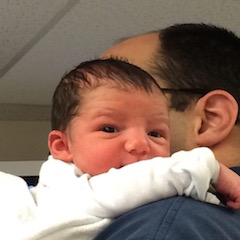It is the best of arguments, it is the worst of arguments.
It is the best of arguments because there is copious chronological information from which to synthesize a conclusion. It involves the most important event in the history of the universe. And it is an argument in which well-meaning, intellectually honest people can disagree.
It is the worst of arguments because the Bible never explicitly identifies the day of the week by number or sequence. There is copious chronological information to work from, yet one cannot come to a conclusion without de-emphasizing certain Biblical evidence no matter what one’s conclusion is. It involves the most important event in the history of the universe, yet well-meaning, intellectually honest people cannot come to a mutually satisfactory conclusion.
I believe Jesus Christ died on a Thursday.
There is plenty of Biblical evidence for this. Engaging all of it would involve more space than the scope of this post merits, but there are a few important highlights worth mentioning.
A pivotal verse in this timeline is obviously Matthew 12:40. Jesus speaks of Jonah’s three days and three nights in the whale’s belly, and draws a direct correspondence to the three days and three nights he will spend in the heart of the earth.
Those who would argue for a Friday crucifixion, if they are using Biblical evidence, must argue that Jesus is somehow not speaking literally. Dwight Pentecost(1) writes this off as Jesus speaking “idiomatically,” for example. However, there is no evidence for Jesus speaking idiomatically or otherwise being anything other than literal in a plain reading of the text. He is drawing a direct, one-to-one comparison between Jonah’s time in the whale and his own time in the grave.
Further, the Gospel of John goes to some length to provide information that sheds light on the chronological situation. To begin with, it is quite clear that the evening following the trial of Jesus is the “official” passover feast as observed by the Jewish leaders(2), since the leaders would not defile themselves in the judgment hall so that they would be able to partake of the passover meal later that day (John 18:28). God through John further elaborates that it was the “preparation of the passover” in John 19:14.
This is important, since the passover feast took place at dusk of the 14th day of the month of Nisan (or Abib; the name was changed after the captivity), and the feast of unleavened bread followed immediately on the 15th, a day that would start in the evening immediately following the passover feast (See Leviticus 23:4-8). That day was a sabbath.
And John 19:31 makes it clear that the sabbath being prepared for was a “high” day, that is, a special sabbath taken as required for the first day of the feast of unleavened bread.
The implication here is that Jesus was crucified on Nisan 14 and hung on the cross as the paschal lambs were being slaughtered for the passover; he was then removed from the cross and buried immediately prior to the fall of darkness that evening, the beginning of the feast of unleavened bread, a high day sabbath. On a Thursday, this would result in two consecutive sabbaths, followed by a Sunday morning in which the Mary and company would be anxious to finally anoint the body.
There are a few other pieces of evidence as well, such as when that Sunday is described as the “third day since these things were done” in Luke 24:21, and the Greek rendering of “sabbaths” as plural in Matthew 28:1. I find those important but less compelling than Matthew 12:40, which is without question the hinge verse upon which the Thursday argument turns. He said, “Three days and three nights.” Did He mean it?
I believe Christ died on Thursday.
But not everybody does.
I know good, Biblically diligent people who argue for Wednesday. That is fine, although I find there are too many problems with that view. The two at the front of my mind are the “missing day,” Friday, which in this scenario is not a sabbath (the high day sabbath being Thursday) and in which Mary and company simply wait and do nothing; and the fact that a full 72-hour three-day three-night period requires Christ to rise from the dead… at dusk Saturday night.
And I know of good, Biblically diligent people who argue for Friday.
Some argue that the immediate language used in the synoptic gospels suggests a Friday crucifixion. A plain reading of the end of Mark 15 into Mark 16 certainly suggests this: In verse 47, we see, “ And Mary Magdalene and Mary the mother of Joses beheld where he was laid. And in the next verse, 16:1, we see, “And when the sabbath was past…”
When this was written, there was no chapter break. Just an unbroken narrative. So I understand the challenge those verses put to the Thursday scenario. I would point out that while these and a couple other companion verses do not state the existence of two sabbath days, they do not specifically deny them either.
Additionally, the frequent use of the term “the third day” in reference to the Sunday of the resurrection can be grammatically construed to argue for a Friday crucifixion by clarifying that the way such a term was used by those speakers was to inclusively list any part of any day. So a small part of Friday, Saturday, and a small part of Sunday.
Those are the Biblical Friday arguments that a Thursday theorist must overlook. They are significant, yes; I do not believe they are any more compelling (and, I believe, they are actually a bit less) than overlooking Matthew 12:40.
The main issue that rankles in this question is not people who argue for Friday from Biblical evidence.
The issue that rankles is the large numbers of people who would consider themselves to be Biblically diligent who hold a to a Friday crucifixion without examining the Biblical evidence at all.
Many of these people, whom I generally respect, would argue that doing or believing something just because one has always done or believed that is inadequate. That it is wrong to hold to “tradition.” They make many choices that deliberately buck “tradition,” arguing that such a choice cannot be wrong because the Bible is what matters.
But they will say the crucifixion was on Friday because that is what almost everybody else is doing.
Look, I believe that this issue falls solidly into the territory covered by Romans 14:5. I will not separate with someone over what day they think Christ died, or even with someone who doesn’t want to identify a day at all. I think it is possible for good people to disagree.
But Romans 14:5 does say that everyone should be “fully persuaded in his own mind.” For the student of the Bible, this is actually an enjoyable study, because there is lots of information in the scriptures that one can find to identify times and days in that final, awful, wonderful week. I have four pages of scripture references and brief notes just cataloguing what the Gospels say about it.
Don’t just say “It was Friday” because everybody else does. And, for that matter, don’t just say “It was Wednesday” or “Thursday” because catholics celebrate Friday or because you saw the headline of an article a few years ago. Study it. Be fully persuaded.
And then, if someone who has looked at the same information disagrees, ¯\_(ツ)_/¯
It is the worst of arguments, it is the best of arguments.
Yeah, I think it’s important to come to a Biblical conclusion about an issue like this. The day that Christ died is extremely important. It’s the day that He paid for my sins.
But, just as important: He is not dead anymore.
——————-
(1) Dwight Pentecost, The Words & Works of Jesus Christ, Zondervan, 1981, pg 575. Pentecost’s layout of the different arguments for the day of the crucifixion are interesting, but I find that he neglects to address Thursday arguments effectively and is too quick to ignore certain evidence. He also makes errors with regards to the chronology of the week in the Thursday hypothesis. Still, he argues from Scripture, which I appreciate.
(2) A consequence of my study of the different chronological passages is that I find a far more confusing issue involves the question of which day people celebrated the actual passover meal. A cursory scholarly search has been unsatisfactory; the best solution offered (by Hoehner, as quoted by Pentecost) is that Galileans and Judeans celebrated the passover on different days. This does fit both the Synoptic references to the passover and John’s clear reference to the passover occurring after the resurrection. It is, however, unsatisfying. I find the passages in John compelling, so at the very least it is clear to me that the majority of the city sat down to celebrate the passover as their true passover lamb was being lowered from the cross and buried in a nearby tomb.






